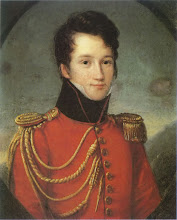Nietzsche Foresees the Future of
Literary Criticism
‘The Will to Power is the Eternal Return of every
event,
even – God help us! – of post-structuralist criticism’.
F.
Nietzsche (slightly adapted.)
‘When
you go in to woman, take your whip!’
Mad
Nietzsche lay spreadeagled on the rug
In
Madame Fifi’s[i]
boudoir, with her spurred
And
booted foot set firmly on his neck.
Her
tingling lash cracked fast across his back,
Urging
the spirochaetes that filled his blood
To
swarm into his syphilitic brain
And
fill his mind with wild philosophy.
‘One
must admit that Newton
got things right.
In
his mechanic, clockwork universe,
Each
atom, being eternal, must return
To
just that place which held it once before,
And
that being so, all Nature is a stage
On
which we actors strut and strut again
In
infinite recurrence. It must be
That
Madame Fifi’s sharp-spurred boot and whip,
This
Persian rug, this boudoir’s cloying scents,
Those
ghastly vases on her mantle-shelf,
And
even that loathsome pug upon her couch
Which
yaps around my ankles twice a week
Among
these keen accoutrements of pain –
And
first and foremost, even I myself,
I,
Friedrich Nietzsche – all must come again,
Over
and over. All must come again!’
And
then, like Dionysius in his joy,
Cavorting
with Bacchantes in the hills,
–
Fair Dworkin’s[ii]
flock, clad in the purloined pelts
Of
phallic oafs and patriarchal poets –
Around
the University of
Basel[iii]
When
Zurich bankers
raise the interest rates,
And
dour Geneva’s
gloomy banks rejoice,
He
came and came again. Then went his way,
Having
paid Madame Fifi twenty francs
(Ten
centimes for each lash-mark he received),
Musing
aloud: ‘Twas cheap at twice the price,
Even
though paid in sold, Switzer gold,
To
give me inspiration for my book
Where
Zarathrustra will appear again,
Great
sage, descending to the market-place
To
voice sublime thought to a brutish herd
Who
cannot recognise the Ubermensch,
Being
sunk in sickly Christianity
And
other craven values of the weak.
And
I foresee, in glorious Wars to come,
Germania’s soldiers shall this volume bear
Within
their knapsacks, by Imperial order,[iv]
Until
a Leader rises who shall purge
Our
sacred soil of baser elements
And
prove, by His own deeds, that God is dead.
Nor,
when the Gay Science[v]
comes, will men forget
I
prophesied this time of blut und boden,[vi]
For
sweet Elizabeth
[his sister’s name]
Will
see that even Jews applaud my fame.’[vii]
That
said, he paused beneath a gas lamp’s glare,
And
wrote down in a calf-bound diary
With
a slim pencil – present from dear Liz –
A
lengthier version of his earlier thought:
‘When
you go into Woman, take your lash!
She
may have lost that instrument of pain
So
won’t inspire philosophy (for cash)
Within
th’alembic of your teeming brain,
Which
one day ponderous Teuton dons will loot,
And
cunning French Idealists plagiarize,
Blackening
the groves of Literature with soot
And
burying Art in self-refuting lies.
So
even Shakespeare, chief of Albion’s glories,
Will
find his plays reduced to doubtful stories,
And
grim Aporia, of all gods the queerest,
Transform
the hapless Will to Cultural Theorist.
The
New Historians show he loved a lord
And
semioticians prove that he was bored,
While
deconstructionists – all undersexed –
Will
claim that nothing ‘Is’ outside the Text.
Bourdieu,
Bataille, Irigaray, Foucault,
Greimas,
Le Doeuff, Lacan and Adorno,
Genette,
Bakhtin, Merleau-Ponty, Eco,
Lacan,
Hjelmslev, Dumezil and Blanchot
Touraine, Levinas, Laclau, Barthes and Mauss,
My
followers, base slaves devoid of nous,
Idealist
trash, lashed on by Will to Power,
Will
heap their scorn on literature’s fair flower,
Destroy
true genius, overthrow the strong,
Banish
all Art and confound right with wrong.
Dull
Theory will arise to spread her pall
And
darkness and confusion cover all.’
He
closed his book; then shrinking from the light,
Like
Truth and Knowledge fled into the night[viii].
[i] Certain scholars allege that her name was actually
Lucy. However, it is clear that they are confusing this dominatrix with
Wordsworth’s beloved, who, to the best of our knowledge, was both too rustic
and too naïve to have indulged in such Swinburnian practices.
[ii] A leading contemporary feminist, whose intellect
is excelled only by her ethereal beauty and her studied elegance of dress.
[iii] The university where Nietzsche held his Chair
until invalided from service by syphilis etc.
[iv] During WWI, all German soldiers were issued with a
copy of Thus Spake Zarathrustra to
while away dull hours in the trenches.
[v] Die
frohliche Wissenschaft – the crisis of Nihilism that only the strong will
rejoice in.
[vi] ‘Blood and soil’, a Nazi shibboleth.
[vii] Elizabeth
married Richard Forster, one of the most notorious anti-Semites of the time.
After Nietzsche’s death in 1900, she edited her brother’s works in such a way
that her late husband would have approved of them.
[viii] Post-structuralism, heir to Nietzsche’s doctrine
of Perspectivism, states that it is true – a matter of common knowledge – that
truth and knowledge do not exist. Logic too, one presumes?
COPYRIGHT (C) 2010 J D FRODSHAM




No comments:
Post a Comment